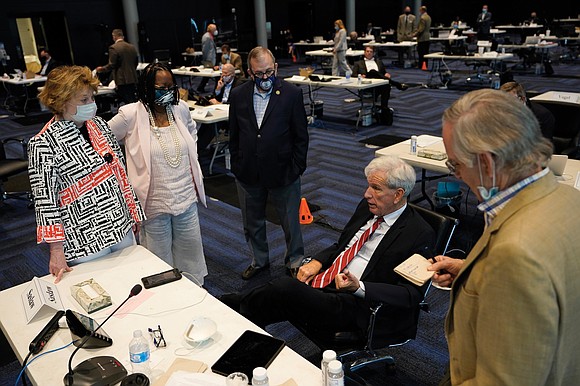Police reform legislation having tough time in General Assembly special session
Jeremy M. Lazarus | 9/10/2020, 6 p.m.

Police reforms and other legislation are hardly sailing through the Democratic-controlled General Assembly.
Three weeks into the special session that opened Aug. 18, none of the legislation sparked by the national wave of protests following the Minneapolis police killing of George Floyd has passed both the House of Delegates and the state Senate.
As of Wednesday morning, according to the online legislative information system, the two houses have sent just one item to Gov. Ralph S. Northam to sign into law and passed 118 resolutions — 87 by the House and 31 by the Senate — commending organizations and individuals and remembering significant people who have died.
The one bill that has made it through both chambers was requested by the governor and was approved on party-line votes. It authorizes $2 million to reimburse local voter registrars for providing pre-paid postage on return envelopes to voters who will use mail-in ballots in the Nov. 3 election.
Approved Sept. 4, the legislation also authorizes local registrars to set up drop boxes to collect completed ballots people want to deliver by hand.
Even an amended budget to fill a potential $2.7 billion hole in the current two-year spending plan is still a work in progress, although that, along with police reform, was a key reason the special session of the General Assembly was called.
Lobbyist R. Ronald Jordan told Richmond City Council on Tuesday that work on the state budget could linger into October.
A prime example of the struggle for police reform involves a bill that would strip away legal immunity from police officers accused in civil lawsuits of brutality and/or violations of constitutional rights and also allow their employers to be sued.
The proposed legislation also would allow individuals to file such suits in state courts. Virginians now must sue in federal court.
Instead of swift passage, one version of the legislation already has died in the 40-member Senate.
A similar bill in the 100-member House had to be revived twice before finally passing 49-45 Tuesday, with two abstentions and four members not participating.
Richmond Delegate Jeff M. Bourne and Norfolk Delegate Jay Jones have spearheaded the House bill that would eliminate that protective legal doctrine of qualified immunity that often shields officers from liability in Virginia courts and also eliminates separate legal immunities that protect local and state governments as well as private companies that hire off-duty officers from such lawsuits.
Opposed by police chiefs, the bill would open the door to taxpayers and companies having to foot the bill for big judgments resulting from a court or jury finding that one or more officers undertook actions that caused injury or harm or violated constitutional rights.
The House Democratic Caucus and the Virginia Legislative Black Caucus have listed the bill as a major priority in the wake of recent protests.
However, legislative observers believe there is little prospect the bill will become law and consider it more likely that it will land on the Senate’s scrap pile.






